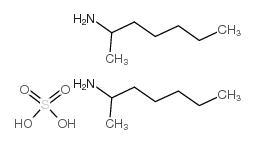6411-75-2
| Name | (+/-)-2-aminoheptane sulfate |
|---|---|
| Synonyms |
2-AMINOHEPTANE SULFATE
2-heptylaminesulfate Tuaminoheptan EINECS 229-113-5 1-methyl-hexylamine,sulfate tuaminoheptanesulfate 1-Methyl-hexylamin,Sulfat TUAMINE SULFATE |
| Boiling Point | 145.4ºC at 760 mmHg |
|---|---|
| Melting Point | 289-291ºC |
| Molecular Formula | C14H36N2O4S |
| Molecular Weight | 328.51200 |
| Flash Point | 54.4ºC |
| Exact Mass | 328.24000 |
| PSA | 135.02000 |
| LogP | 5.65640 |
|
Version 1.2
Regulation (EC) No 1907/2006 1 - Product and Company Information Product Name1-METHYLHEXYLAMINE SULFATE - 1 GM 2 - Hazards Identification 3 - Composition/Information on Ingredients Product NameCAS #EC noAnnex I Index Number 2-AMINOHEPTANE HEMISULFATE6411-75-2 229-113-5 None FormulaC7H17N.1/2H2O4S Synonyms2-Aminoheptane sulfate * 2-Heptanamine, sulfate (2:1) * 2-Heptylamine sulfate * 1-Methylhexylamine sulfate * Tuamine sulfate * Tuaminoheptane sulfate 4 - First Aid Measures AFTER INHALATION If inhaled, remove to fresh air. If breathing becomes difficult, call a physician. AFTER SKIN CONTACT In case of skin contact, flush with copious amounts of water for at least 15 minutes. Remove contaminated clothing and shoes. Call a physician. AFTER EYE CONTACT In case of contact with eyes, flush with copious amounts of water for at least 15 minutes. Assure adequate flushing by separating the eyelids with fingers. Call a physician. AFTER INGESTION If swallowed, wash out mouth with water provided person is conscious. Call a physician. 5 - Fire Fighting Measures ALDRICHwww.molbase.com EXTINGUISHING MEDIA Suitable: Water spray. Carbon dioxide, dry chemical powder, or appropriate foam. SPECIAL RISKS Specific Hazard(s): Emits toxic fumes under fire conditions. SPECIAL PROTECTIVE EQUIPMENT FOR FIREFIGHTERS Wear self-contained breathing apparatus and protective clothing to prevent contact with skin and eyes. 6 - Accidental Release Measures PROCEDURE(S) OF PERSONAL PRECAUTION(S) Wear protective equipment. METHODS FOR CLEANING UP Sweep up, place in a bag and hold for waste disposal. Avoid raising dust. Ventilate area and wash spill site after material pickup is complete. 7 - Handling and Storage 8 - Exposure Controls / Personal Protection ENGINEERING CONTROLS Mechanical exhaust required. PERSONAL PROTECTIVE EQUIPMENT Special Protective Measures: Wear appropriate government approved respirator, chemical-resistant gloves, safety goggles, other protective clothing. 9 - Physical and Chemical Properties pH N/A BP/BP RangeN/A MP/MP RangeN/A Flash PointN/A FlammabilityN/A Autoignition TempN/A Oxidizing Properties N/A Explosive Properties N/A Explosion LimitsN/A Vapor PressureN/A Partition Coefficient N/A ViscosityN/A Vapor DensityN/A Saturated Vapor Conc. N/A Evaporation RateN/A Bulk DensityN/A Decomposition Temp.N/A Solvent ContentN/A Water ContentN/A Surface TensionN/A ConductivityN/A Miscellaneous DataN/A SolubilityN/A ALDRICHwww.molbase.com 10 - Stability and Reactivity STABILITY Stable: Stable. HAZARDOUS DECOMPOSITION PRODUCTS Hazardous Decomposition Products: Carbon monoxide, Carbon dioxide, Nitrogen oxides, Sulfur oxides. HAZARDOUS POLYMERIZATION Hazardous Polymerization: Will not occur 11 - Toxicological Information RTECS NUMBER: MQ5600000 ACUTE TOXICITY LD50 Intraperitoneal Rat 60 MG/KG Remarks: Behavioral:Tremor. Behavioral:Convulsions or effect on seizure threshold. Behavioral:Excitement. LD50 Intravenous Rat 47300 UG/KG Remarks: Behavioral:Convulsions or effect on seizure threshold. LD50 Intraperitoneal Mouse 163 MG/KG Remarks: Behavioral:Change in motor activity (specific assay). Lungs, Thorax, or Respiration:Other changes. Sense Organs and Special Senses (Nose, Eye, Ear, and Taste):Eye:Other. LD50 Subcutaneous Mouse 100 MG/KG Remarks: Behavioral:Convulsions or effect on seizure threshold. LD50 Intravenous Mouse 16300 UG/KG Remarks: Behavioral:Convulsions or effect on seizure threshold. SIGNS AND SYMPTOMS OF EXPOSURE Prolonged or repeated exposure can cause nasal congestion and rhinorrhea. Overexposure to high concentrations can cause tachycardia and hypertension. ROUTE OF EXPOSURE Multiple Routes: May be harmful by inhalation, ingestion, or skin absorption. May cause irritation. ALDRICHwww.molbase.com CONDITIONS AGGRAVATED BY EXPOSURE The toxicological properties have not been thoroughly investigated. 12 - Ecological Information No data available. 13 - Disposal Considerations SUBSTANCE DISPOSAL Dissolve or mix the material with a combustible solvent and burn in a chemical incinerator equipped with an afterburner and scrubber. Observe all federal, state, and local environmental regulations. 14 - Transport Information RID/ADR Non-hazardous for road transport. IMDG Non-hazardous for sea transport. IATA Non-hazardous for air transport. 15 - Regulatory Information COUNTRY SPECIFIC INFORMATION Germany WGK: 3 Self-Classification 16 - Other Information WARRANTY The above information is believed to be correct but does not purport to be all inclusive and shall be used only as a guide. The information in this document is based on the present state of our knowledge and is applicable to the product with regard to appropriate safety precautions. It does not represent any guarantee of the properties of the product. Inc., shall not be held liable for any damage resulting from handling or from contact with the above product. See reverse side of invoice or packing slip for additional terms and conditions of sale. Copyright 2010 Co. License granted to make unlimitedpaper copies for internal use only. DISCLAIMER For R&D use only. Not for drug, household or other uses. ALDRICHwww.molbase.com SECTION 16 - ADDITIONAL INFORMATION N/A |
CHEMICAL IDENTIFICATION
HEALTH HAZARD DATAACUTE TOXICITY DATA
|
| Risk Phrases | R22 |
|---|---|
| Safety Phrases | S22-S36/37 |
| HS Code | 2921199090 |
| HS Code | 2921199090 |
|---|---|
| Summary | 2921199090 other acyclic monoamines and their derivatives; salts thereof VAT:17.0% Tax rebate rate:9.0% Supervision conditions:none MFN tariff:6.5% General tariff:30.0% |
